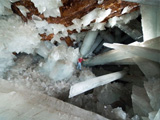|
|
TODAY.AZ / Weird / Interesting
Real-life 'Superman cave' found in Mexico's Naica mine
26 July 2011 [12:30] - TODAY.AZ
 These crystal-lined caves may look like Superman’s ethereal Arctic lair, the Fortress of Solitude, but they are ‘one of the wonders of the world’.
These crystal-lined caves may look like Superman’s ethereal Arctic lair, the Fortress of Solitude, but they are ‘one of the wonders of the world’.Discovered by two miners looking for lead, the stunning white beams
of gypsum have been growing at a snail’s pace for hundreds of thousands
of years in caves below Naica in Mexico.
The country’s government is being urged to claim world
heritage status to protect the unique formations for future generations –
ten years after they were discovered.
The crystals have grown up to 11m (36ft) but it is not known why the formations fill the caves at such haphazard angles.
‘They’re really one of the wonders of the world,’ said Juanma
Garcia Ruiz, a geologist from Spain’s Instituto Andaluz de Las Ciencias
de la Tierra, who has studied at the mine.
‘They really are something amazing and there are still people
in Mexico who don’t know how important it is to preserve them as much as
possible.’
The formation of the beams 290m (950ft) below the surface,
occurred when super-heated water began cooling and became saturated with
gypsum.
Over time, crystals formed in the water.
One of the problems preventing the site being studied further
is the heat from a nearby spring. Temperatures are so hot it is not
possible to stay there for longer than ten minutes at a time.
But Prof Ruiz insists that should not mean the site is neglected, saying: ‘The crystals need to be preserved much better. Naica is very unique and the chance of having another one on the planet is very low.’
/Metro/
URL: http://www.today.az/news/interesting/91359.html
 Print version
Print version
Connect with us. Get latest news and updates.
See Also
- 06 December 2024 [22:20]
Are scented candles harmful to health? - 23 November 2024 [14:11]
Magnitude 4.5 earthquake hits Azerbaijan's Lachin - 20 November 2024 [23:30]
Launch vehicle with prototype of Starship made its sixth test flight - 27 October 2024 [09:00]
Fuel prices expected to rise in Sweden - 24 October 2024 [19:14]
Turkiye strikes terror targets in Iraq and Syria - 23 October 2024 [23:46]
Kazakhstan supplied almost entire volume of oil planned for 2024 to Germany in 9 months - 23 October 2024 [22:17]
Taiwan reported passage of Chinese Navy aircraft carrier near island - 23 October 2024 [21:50]
Russia remains largest oil supplier to India - 16 October 2024 [17:54]
Gamesummit co-founder shares insights on future of gaming industry in Azerbaijan [EXCLUSIVE] - 12 October 2024 [18:27]
TikTok cuts jobs, turns to AI for content moderation
Most Popular
 Pashinyan plants a pig for the Armenians
Pashinyan plants a pig for the Armenians
 Changing global geopolitics & implications for Pakistan
Changing global geopolitics & implications for Pakistan
 Turkish FM meets Syrian leader in post-Assad era
Turkish FM meets Syrian leader in post-Assad era
 New Zealand rejects plan to introduce its own passports for residents of Cook Islands
New Zealand rejects plan to introduce its own passports for residents of Cook Islands
 Gloveman: Macron and his one-time premieres
Gloveman: Macron and his one-time premieres
 Chairman of Israel-Azerbaijan Joint Economic Committee congratulates Azerbaijani President
Chairman of Israel-Azerbaijan Joint Economic Committee congratulates Azerbaijani President
 Macron described as 'extremely paranoid', says French media
Macron described as 'extremely paranoid', says French media
